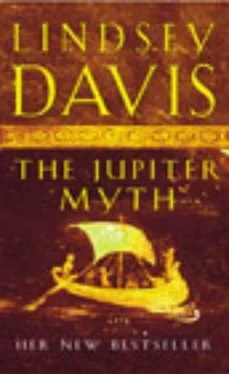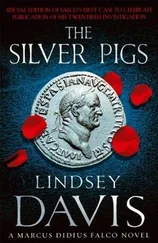Lindsey Davis - The Jupiter Myth
Здесь есть возможность читать онлайн «Lindsey Davis - The Jupiter Myth» весь текст электронной книги совершенно бесплатно (целиком полную версию без сокращений). В некоторых случаях можно слушать аудио, скачать через торрент в формате fb2 и присутствует краткое содержание. Жанр: Исторический детектив, на английском языке. Описание произведения, (предисловие) а так же отзывы посетителей доступны на портале библиотеки ЛибКат.
- Название:The Jupiter Myth
- Автор:
- Жанр:
- Год:неизвестен
- ISBN:нет данных
- Рейтинг книги:5 / 5. Голосов: 1
-
Избранное:Добавить в избранное
- Отзывы:
-
Ваша оценка:
- 100
- 1
- 2
- 3
- 4
- 5
The Jupiter Myth: краткое содержание, описание и аннотация
Предлагаем к чтению аннотацию, описание, краткое содержание или предисловие (зависит от того, что написал сам автор книги «The Jupiter Myth»). Если вы не нашли необходимую информацию о книге — напишите в комментариях, мы постараемся отыскать её.
The Jupiter Myth — читать онлайн бесплатно полную книгу (весь текст) целиком
Ниже представлен текст книги, разбитый по страницам. Система сохранения места последней прочитанной страницы, позволяет с удобством читать онлайн бесплатно книгу «The Jupiter Myth», без необходимости каждый раз заново искать на чём Вы остановились. Поставьте закладку, и сможете в любой момент перейти на страницу, на которой закончили чтение.
Интервал:
Закладка:
Everyone was horrified. The message from the tribune was curt bureaucracy: L. Petronius Longus was to be informed with regret that two of his children had succumbed to the chickenpox.
'Which two?' Helena demanded.
'It does not say -' Hilaris at once faced a barrage of female anger.
'You must send a signal urgently,' his wife commanded. 'We have to be able to tell this poor man which of his daughters has survived!'
'Are they all daughters?'
'Yes, he has three daughters; he speaks of them very fondly. Gaius, you cannot ever have been listening.'
Maia, my sister, had remained silent, but she met my eyes with horror. We knew that Petronius had been laid up with the chickenpox himself, no doubt caught from his children, as he travelled here through Gaul. All of Maia's brood had it at the same time. Any of them might have died. If it had been Petro who succumbed, the four young Didii would have been stranded. Maia would have been bereft. I saw her close her eyes, shaking her head slightly. That was all the comment she could ever make.
I was aware of her eldest, Marius and Cloelia, watching us with their eyes wide. We adults avoided looking at them, as if talking amongst ourselves conferred some kind of privacy.
Thinking of the three Petronius girls, those of us who knew them were stricken. All three had always been delightful. Petro had been a solid father, romping with them when he was at home, but insisting on regular discipline. They were his joy: Petronilla, the sensitive eldest, a father's girl who had taken her parents' separation harder than the rest; sweet, neat Silvana; adorable round-faced, barely school-age Tadia.
We were realists. To bring three children into the world was the Roman ideal; to keep them alive was rare. Birth itself was a risk. A whisper could carry off an infant. More precious children died at less than two years old than ever marked the formal passage out of infancy at seven. Many slipped away before ten and never entered puberty. The Empire was filled with tiny tombstones, carved with miniature portraits of toddlers with their rattles and pet doves, their memorials full of exquisite praise for best-loved, best-deserving little souls, snatched away from grieving parents and patrons after lives of heart-rending brevity. And never mind what the damned jurists say: Romans make no distinction between boys and girls.
In an Empire whose business was the army, far-reaching trade and administering lands overseas, many a father lost his children in his absence too. To be one of many would not make it easier. Petronius would blame himself, and he would suffer all the more because he heard this news a thousand miles away. Whatever past troubles had happened between him and Arria Silvia, he would have wanted to support her, then to comfort and reassure his remaining child. He would think it important to preside at the tragic funerals of the lost two.
The worst was, knowing this and knowing that he did not know.
It was too much. I left the room quietly, finding my way by instinct to the nursery. There I sat on the floor among the miniature chairs and walking frames, holding my own two warm little treasures tight. My mood must have affected them; Julia and Favonia became subdued, letting me embrace them for my own comfort.
Maia came in. Only one of hers was in the nursery. Marius and Cloelia had disappeared; the eldest were allowed out if they promised to be careful. Ancus, a quirky soul, had decided he was tired and put himself to bed for a siesta. Rhea was here alone, crawling round on a rug, playing some long-winded epic game with a set of pottery farm animals. Maia did not touch her youngest daughter, just sat on a chair, hugging her arms around her own body, watching.
After a long time, my sister asked me, 'Do you think he knows?'
'What?'
She explained patiently, 'Do you think someone else has already told him, and he has gone back home without informing us?'
I knew why she asked. That would be just like him.
Speaking about his loss would be too painful, and he would be angered by fuss. While others flapped and increased his anguish with well-meaning hysteria, he would want to move, fast.
But I also knew how Petronius would have gone about it. Every debt settled up. Then the swift, scrupulous packing. Each boot-strap, tunic and memento neatly positioned in his luggage roll. He might take himself off, but it would be evident that he had packed up and gone home.
'He still doesn't know. He is here somewhere. I am certain.'
'Why?' demanded Maia.
'All his gear is in his room.'
'Well, all except the stuff he would need if he was doing something dangerous.
Maia breathed harshly. 'Then you have to find him, Marcus.'
I knew that. The only problem was, I had no idea where to start looking.
XV
How could I work? Yesterday had been arduous. Today started well, but from lunchtime, with its dreadful news, everything fell apart. All anyone wanted was to go into huddles to discuss this shock. The only person who talked sense, in terms I recognised, was Helena.
'Petronius may be anywhere in town, or he may even have travelled away. Don't waste energy, Marcus. He will resurface when he's ready. In the meantime, what's lost?'
'From his point of view, nothing,' I agreed sombrely.
'Silvia and the poor surviving child won't be expecting anything from him yet. Once he knows, he will rush home to them.'
'Right. Better let him finish whatever he's up to.' He would need a free mind to cope. If he had swanned off with some woman, this would be the wrong moment to break bad news; he would feel guilty for ever. If he was drinking, better let him sober up.
'And whatever,' Helena asked narrowly, 'can he be up to here in Britain, anyway?'
'No idea.' She glared at me. 'Honest, sweetheart; I really have no idea.'
We both sank into reverie. After a long time, Helena said, 'He has only been gone a day.'
A day and a night. Somehow I did not expect to see him back in the near future.
I had to do something. He would not thank me for this, but I did it anyway. I drew up a missing-person sheet that Frontinus could issue to the legionaries.
L. Petronius Longus, Roman male of thirty-four years, freeborn; good height; serious build; brown hair; brown eyes. If subject spotted, observe and notify governor's office. Do not approach or arrest subject. Do not insult, beat up, or otherwise maltreat subject. If forced to make your presence known, urge subject's immediate contact with the governor's office and withdraw.
Do not inform subject his heart is about to be broken, lads. Leave it to the old clich the appropriate quarters. This filthy task is detailed to his best friend.
I did go out to look for him. I wandered about all afternoon. All I found were Marius and his dog, peering shyly into bars. I took them home. On the way we ran into Maia and Cloelia. They claimed they were out shopping. I took them home too.
As we arrived back at the procurator's house, a swirl of horsemen and a carriage rattled up to its stately portico. That was all I needed: King Togidubnus had wasted no time and had already arrived. Since I still had no information or explanations on who had drowned his disgraced retainer, I was the one who would probably catch most of the crud the King threw – plus anything else Julius Frontinus added, hoping it would seem any lack of progress on the case was not his fault.
Part of me did not care. A trousered killer had been killed himself and if it started a war, well at the moment I quite felt like a good war with somebody.
There is a special atmosphere in official buildings when a political crisis starts.
At one level everything continued as normal. Aelia Camilla ran her household quietly, showing by only the faintest frown that she anticipated difficulty in keeping mealtimes properly. The governor, the procurator, various officials, and the agitated King, were all in conference behind closed doors. Efficient slaves came and went, carrying scrolls or refreshment trays. They were keyed up with excitement; there was a sense that routine business would be overridden. The diary was being scrapped: meetings that had been fixed for weeks were cancelled or hastily rearranged. Dispatch riders and signallers were held at the ready. Arriving messengers were rounded in a side-room and crisply advised that they would have to wait because of the flap. Local officers and officials were summoned in a hurry; escorted in; then they left again in double-quick time, most looking as though they had somehow been caught out.
Читать дальшеИнтервал:
Закладка:
Похожие книги на «The Jupiter Myth»
Представляем Вашему вниманию похожие книги на «The Jupiter Myth» списком для выбора. Мы отобрали схожую по названию и смыслу литературу в надежде предоставить читателям больше вариантов отыскать новые, интересные, ещё непрочитанные произведения.
Обсуждение, отзывы о книге «The Jupiter Myth» и просто собственные мнения читателей. Оставьте ваши комментарии, напишите, что Вы думаете о произведении, его смысле или главных героях. Укажите что конкретно понравилось, а что нет, и почему Вы так считаете.












